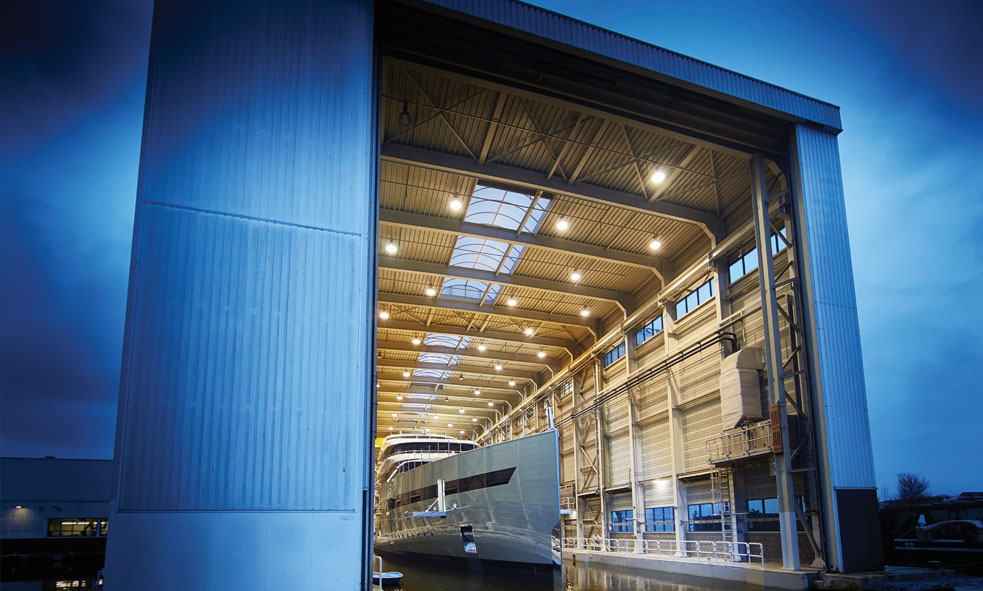
Building the Dream

Knowing that you would like to build a yacht is one thing, but finding out who will build it to your specifications, on time, on budget, and offer the right advice without any nasty surprises cropping up halfway through can be time consuming, hard to achieve, and for a first time builder, near impossible. Unless, that is, you employ the dream team.

Building a new yacht is a unique experience that every yachtsman should take part in at least once in their lifetime. The construction of a large yacht can be a long and complex undertaking, but with the right team of people this can be an extremely rewarding experience. Fraser Yachts looks at five key players instrumental to a successful new build.
The Broker
Many owners who opt to work with a broker on a new build project have a long-term relationship with that broker and are therefore making a deliberate choice to work with a trusted partner. The day- to-day business of a good broker gives him/her invaluable experience, insight and knowledge about yachts and the market. It is this extensive experience, built up over many years in the field, that a client benefits from,'' explains Antoine Larricq, sales broker at Fraser Yachts. A broker will often be the one that suggests the option of a new build as a possibility to a client in the first place. When the client principal' is ready, the broker will help them understand what they want and define their brief. Once defined, the broker will approach the most suitable yards for that particular project at that particular point in time on behalf of the client. Knowledge of the yards' key competencies, order book, quality and financial integrity are just a few of the key elements a broker will take into account. The broker will then work with the client to put together the right team, including legal and technical advisers. The broker will help negotiate the price, contract terms, specification, general arrangement and design; knowing (from experience) which details to tweak or ignore and the pitfalls to avoid. It is essential to have checked every detail of the specification and contract clauses before signing the build contract in order to minimise the number of change orders during the construction. Change orders can have a serious impact on the final cost and delivery time. During the actual building process the broker's position is such that they will step in and out to help the client and the shipyard whenever and however needed. The broker's role is essentially to know the client and the market, and to know where and how to guide the client to achieve a smooth process and the desired end result.
The Lawyer
A lawyer is a necessity for any high-value deal, yachts included, but use of a specialist marine lawyer will be of particular benefit for a new build: Lawyers specialising in yacht construction will generally see more projects in a year than any of their clients, giving them a broad range of possible solutions to any problem that may arise,'' says Jay Tooker of Holman Fenwick Willan LLP. As yachts increase in size, value and complexity, so yacht contracts become more detailed and sophisticated. Most yacht construction projects are like a complicated puzzle in which everything has to fit together correctly, and in a legally-enforceable way, if both parties are to get what they want,'' says Tooker. Tooker cautions against seeing a lawyer as a weapon: Owners who think they need a lawyer who will kick the shipyard into shape and win' the contract negotiation are short-sighted. A win' at this stage may achieve nothing more than a long and bitter relationship between the parties.'' Rather, a good lawyer will help agree a structure that works for both sides, whilst anticipating potential problems and practically discussing solutions. The lawyer an owner really needs is one who can protect him but also find a way to keep the project moving forward.''
The Project Manager
Juggling many responsibilities, the project manager ensures smooth running of the overall build. A key early job is ensuring that the contract and specification meet the owner's needs so there are no surprises on completion,'' says Chris Semmens, director at VF Yachts, the project management arm of Fraser Yachts. It is preferable to come into a project from inception to be aware of the owner's needs and to partner with them during the build process.'' The most important elements of the project manager's role are the formulation of the specification list and on site supervision to ensure that what has been contracted is delivered. Other crucial jobs include managing the tender process for the shipyard and/or other key suppliers. Demands of the role dictate that the project manager should be well-versed in both the complexities of a new build and in everyday use of a yacht. Past experience and support from expert partners are the key things an owner should consider when selecting a project manager,'' says Semmens. Feadship's 92m Royal Romance is an example of one project that benefitted from VF Yachts' involvement. During the build, VF Yachts managed the owner's side and were the intermediate between the owner's team and ours,'' says Bas Nederpelt, commercial director at Feadship. In this particular project it really helped to streamline communication and being able to talk to someone with solid experience was a bonus as clients do not always bring in a team with the right experience.''
The Designer
Every yacht must have a designer, but choosing the right designer is crucial. Working closely with the owner to understand their vision is key" says Sander Sinot of Sinot Yacht Design, whose recent projects include the interior of 88.8m Illusion, the biggest yacht under construction in China. It is most important that the owner selects a designer with whom they can establish a good dialogue so that the designer can fully interpret their wishes,'' he says. Designers must be able to react to the client's comments and formulate a common vision rather than simply transplanting a design experience and knowledge of yacht design is also important as this helps us relate fully to the needs of the owner.''
Probably the most important stage of a designer's involvement is the initial conversations around design direction. Once the design direction is set we can then get to work showing clear visualisations of the results to be expected, making the yacht as real as possible in advance,'' says Sinot. Marrying form and function is just as important to ensure the design is actually buildable. By working within the boundaries of technical infrastructure and classification, we make sure that the design is feasible,'' says Sinot. We monitor this throughout the whole process, from concept development to launch of the yacht.''
The Shipyard While some owners may have a very clear idea of who they wish to work with, others might put out multiple tenders. The type of project being built can also dictate the choice of yard. If the owner wishes to have a truly custom project then the shortlist gets shorter because there will be fewer shipyards able to deliver,'' says Nederpelt. Equally, the shipyard should be certain of their ability to deliver what is being asked for. As a shipyard you should know what you are saying yes to,'' says Nederpelt. Many projects can be a stretch for some yards, both in terms of the complexity and financially if you cannot deliver, it is likely to become a stressful and unsatisfactory project for all parties involved.'' Owners should also be sure they are clear what their expectations are. One of the main questions every owner should ask themselves when building their team is what is my ambition and budget for the project, and how much time do I have to dedicate to it,''' says Nederpelt, stressing that the more custom the project the more time is required of both the owner and their team. For Feadship a main priority to ensure project success is building the right team around the project and allocating resources accordingly. We really try to make sure the chemistry of the whole project team is right.''
These are just five roles of many on a new build project and while all are important, one thing is certain: the success of a new build never lies with only one person, it requires team work,'' says Larricq. Making good decisions on who to work with in a new build will see the best possible end results and investing the time to choose wisely pays in the end. Keep your core team as small as possible, so decisions can be made, but make sure the people that are there have solid experience and are team players,'' concludes Nederpelt.
This article is taken from issue XI of FRASER yachting magazine, the intelligent magazine for living, loving and luxury yachts.










